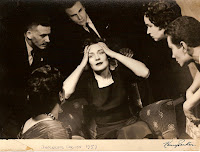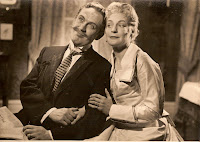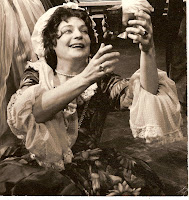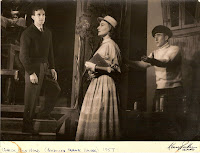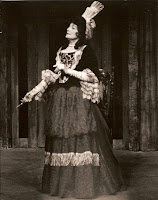My mum seemed perfect in every way. Immaculate in person and in her housekeeping. If I close my eyes I always seem to see her in a pretty print frock, sitting darning by the radio in one of the many flats we lived in.
With Dad’s long hours – I remember the shock once of finding him in the bath with his beard shaved off – a lot of my early childhood was just me and my beautiful mum.
In
Every evening we’d listen to the Archers – she never listened to it after
I remember running out into the garden at Prenton, pursued by Grandma with a tape measure – only because Mum had told me not to allow Grandma to make me any clothes. I hid in the hedge.
She read me all the children’s classics with all the voices. By the time we got to
In
Skinless sausages and baked beans, liver and bacon, curry with sliced fresh banana on top, pork chops with apple and rosemary – my favourite meals after school along with fruit yoghurt bought in pots from over the Banbury Road – a different flavour to try every day.
Mum was a patient and kind disciplinarian, teaching me with words that it was wrong to eat all the babysitter’s sausages and stab all the oranges with my newly acquired scouting knife.
The first love of my life was Sabrina with a mother as seemingly chaotic as my mother was ordered. Sabrina and I quarreled over which Mum was the poorest. This could only be settled by going through their purses. My mum proved the richer by £1 and fourpence. So that was settled. My mum snorted when she found out and convinced me to my Dickensian satisfaction that our family had the honour of being by far the poorer.
Mum taught me my catechism – it was just like learning lines. Faith is a supernatural gift of God that enables us to believe without doubting whatever God has revealed. And she accompanied me to every obligatory church service including the packed rain soaked smelly St
Holidays in a caravan in
My mum hated
Mum spent one holiday when she was not working reading me Gormenghast.
I didn’t buy a guitar to punish my ma.
My years of teenage rebellion were directed at my incense heavy school, encouraged by Mum’s increasingly revolutionary take on the world.
I used to listen to Pick of the Pops in the breakfast room in quiet isolation – because I thought Mum and Dad didn’t like pop music. Though I discovered in London Mum did like Tom Jones – but she worried whether he would keep his voice. When we had our first gramophone they bought me some Shadows records.
She wasn’t too keen on my long hair though but only raised the subject when I was at my most vulnerable – in the bath.
She was very caring about my teenage angst. Though I was very protective in the
So my engagement came as a shock. I phoned the news from a public telephone cabin in
I call these memories non-theatrical because Mum and Dad belonged to an exclusive club that I was on the fringes of. Mum only had one friend in my memory who was not in the business. And that proved a harum- scarum aberration with wild excursions way outside my mother’s comfort zone.
All these memories only provide clues to an intensely private and fascinating person. Over this year I have gazed often at her ever changing face and to her expressive hands. There was so much more to know: so much more to find out.




